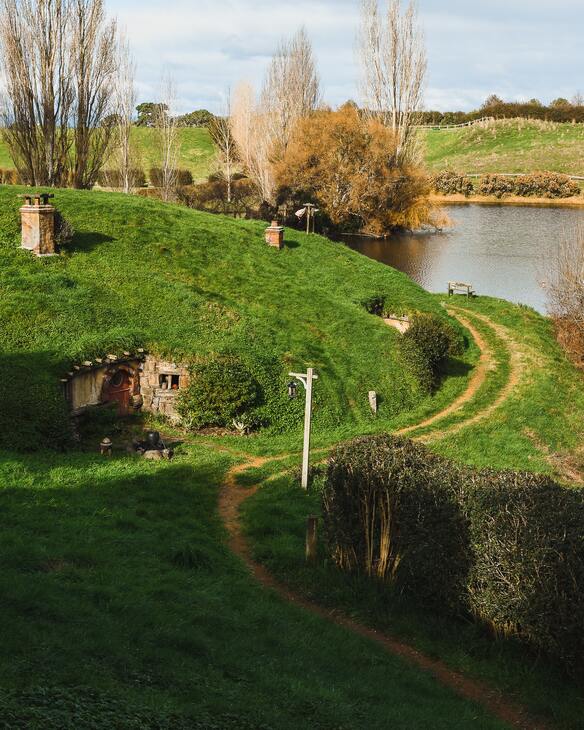Under the dark cover of night, the Dwarves take their fate into their own hands once more. They break and enter into the armory of Lake-town. Bard offered them weapons he himself had at home, the only weapons that could be found outside of the armory, fashioned from all different fishing and blacksmith tools.
The fall
Thorin: “You all right?”
Kili: “I can manage. Let’s just get out of here.”
While trying to maintain the image of a useful and rugged warrior and prince, Thorin hands over all the weapons to Kili to carry downstairs. Unfortunately, as he treads the first stair his right leg buckles underneath him. He falls together with the weapons down the stairs. He wanted to play off his pain as insignificant and still be a productive member of the company, but it is plain to see that he cannot even manage the stairs, let alone the rest of the quest in this state.
Caught
Dori: “Run!”
Glóin: “Quickly! Move now!”
As soon as his fall is heard by the outside Dwarves standing guard, they urge each other to leave. However, as soon as they turn to their left to escape they are met with swords and spears of the Guards of Lake-town, as are the members of the company inside the city armory.
Before the Master
Dwalin: “Get off me! Get off!”
Guard: “Move them along here.”
Braga: “Move on!”
Master: “What is the meaning of this?”
Braga: “We caught them stealing weapons, sire.”
Master: “Ah. Enemies of the state, eh?”
Alfrid: “A desperate bunch of mercenaries, if ever there was, sire.”
The Guards lead the Dwarves before the Master of Lake-town, who was probably enjoying his wealth when this new problem arose with which he now had to deal. The fact is that the Dwarves were stealing weapons and can thus be viewed as enemies of the state, for they have trespassed on their land without leave and instead of being grateful for even coming this far they dared to steal from the town as well.
Alfred, as much as he tries to degrade the Dwarves with his remark, is right. They are desperate, otherwise, they wouldn’t have taken on this incredible risk to their lives to steal from another race who could easily kill them. They are desperate to reclaim Erebor, desperate to reach the Mountain in time, desperate to keep themselves alive long enough to get there in time.
King without a mountain
Dwalin: “Hold your tongue! You do not know to whom you speak. This is no common criminal. This is Thorin, son of Thráin, son of Thrór!”
Thorin: “We are the Dwarves of Erebor. We have come to reclaim our homeland.”
Even though they are guilty of everything the state blames them for, they still retain their pride and ego in a way that no other race probably could. It is interesting to see that they do not have any remorse for what they have done and see their purpose of passing through there as a part of their quest much more important than any transgression they may have done.
They contradict the Master and his counselor although they themselves hold a higher moral ground in spite of their own crudeness and lack of sense of justice. Dwalin represents his King as the greatest King that ever lived, though as the Great Goblin said in the “An Unexpected Journey” he doesn’t have a mountain to rule under. They rest their arguments on a glory that once was but has not been in force for a long while.
Thorin was only a young Dwarven prince when his father disappeared and his grandfather was slain by Azog. So he never did have a chance to rule anything. It is only through the loyalty of the Dwarves he led out of exile that hold him in such high esteem. Everyone else just sees the whole company as too proud, too stubborn, too unrelenting for their own good with a sense of superiority that doesn’t hold any ground in reality.
Recalling history
Thorin: “I remember this town in the great days of old. Fleets of boats lay at harbor, filled with silks and fine gems. This was no forsaken town on a lake. This was the center of all trade in the North! I would see those days return. I would relight the great forges of the Dwarves and send wealth and riches flowing once more from the Halls of Erebor!”
To work a crowd into accepting an outsider the best thing one can do is sympathize with their current state of poverty. Thorin looks to gain sympathy and empathy from the crowd by stating how their town used to be and how it could be again if they were permitted to leave it to reach the mountain in time to open the secret door.
Without a promise of help but rather a fantastic depiction of what would happen if they were let through, Thorin attempts to overtake the crowd with his powerful rhetoric.
Bard’s objection
Bard: “Death! That is what you will bring upon us! Dragon fire and ruin. If you waken that beast it will destroy us all.”
Thorin: “You can listen to this naysayer but I promise you this: if we succeed all will share in the wealth of the mountain. You will have enough gold to rebuild Esgaroth ten times over!”
Bard faces Thorin with the tragic consequences that he would incur with his selfish quest. It is not as if it hasn’t happened before, so Bard draws on past mistakes rather than possible scenarios that could follow their entrance into the mountain. The prophecy says so itself. However, the people of Lake-town, as well as the Dwarves, focus only on the assuredly positive outcome of their quest.
The promise that Thorin gives the people of Lake-town cannot be judged to be either truth or lies. In this stage of his development as a character we could easily be persuaded to believe him. However, knowing what occurs in the third film, we could argue that he already then consciously knew that he would be lying to them just to free himself of any possible incarceration.
He presents the people of Lake-town with a future they have discussed a couple of scenes before. Their imagination wasn’t really imagined if there before them stands the Dwarf who could make it all possible for them. The hope that was rekindled not long ago has now been confirmed to take place just as soon as the Dwarves enter the mountain. A reason to rejoice indeed.
Vouching for character
Alfrid: “Why should we take you at your word? We know nothing about you. Who here can vouch for your character?”
Bilbo: “Me. I’ll vouch for him. I have traveled far with these Dwarves through great danger and if Thorin Oakenshield gives his work then he will keep it.”
It is prudent for Alfrid to ask this particular question. They can come and promise their people anything in the world then take off never to be seen again, which may have been Thorin’s plan all along. However, of all the Dwarves present only Bilbo raises his hand to vouch for Thorin’s character and support his claim to the people of Lake-town. It is interesting to note that none of the other Dwarves came forth to do the same. It somehow sheds a light on their own involvement in the quest.
Some are there out of loyalty and the success of the quest like Kili, Fili, Dwalin, and Balin, but the rest are mostly there either for an adventure, to leave their own pathetic realities, or to simply perform a task they have been asked to do. But not even those loyal to Thorin came to support the credibility of his character. An interesting thought. As much as they are loyal and ready to stand by him through any danger, vouching for him appears to be too much.
Of course, the creative team behind the film thought that Bilbo vouching for Thorin would be an ideal opportunity since it pays off in the final film. Still it leaves room for thoughts on the company as a whole.
Follow me to my next post.
Featured image by Mona Tootoonchinia on Pixabay





